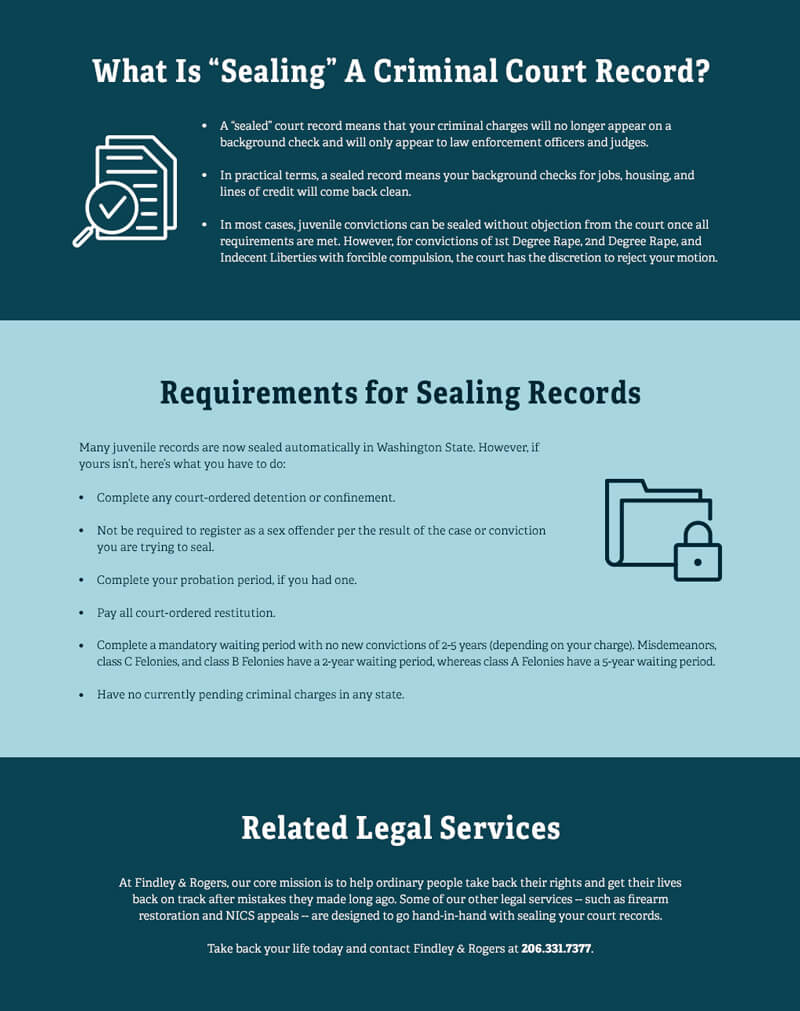How to Seal a Record in 7 Steps
Learning how to seal your record is a legal step that can help you get your life back on track. When you seal your criminal record, it means prospective employers, landlords, and others who may need to do a background check will not see your conviction. This makes life a lot easier!
Today we’re looking at how to seal a record in just 7 steps.

Sealing and Expungement of Criminal Records in Washington State: 7 Steps
Before we examine this in full detail, it’s important to note the differences between sealing a juvenile criminal record versus an adult one.
How to Seal Your Record: Juvenile Convictions
In Washington state, the law is lenient toward juvenile offenders. Washington state law is designed so that somebody who commits a crime in their youth won’t be punished for their crime for the rest of their life. In this way, juvenile offenders have a better chance of rehabilitation, becoming productive members of society, and sealing their juvenile records in Washington.
The requirements for how to seal your record for a juvenile offense are actually quite manageable, and it’s an option for all but the most severe crimes. In fact, many juvenile criminal records in Washington are sealed automatically after an extended period of time. Sometimes, however, you still have to petition the court to have your records sealed.
How to Seal Your Record: Adult Convictions
The technical legal process of sealing adult records in Washington state is different from the process for sealing juvenile ones, but the requirements are very similar.
The biggest difference between sealing adult offenses versus juvenile offenses is that the court has a lot more power to deny sealing an adult record. Once a person meets the criteria to seal a juvenile record, the court doesn’t have the discretion to say ‘no’ (in most cases.) With an adult record, not only can the court say “no,” but the legal default in Washington is that they should say “no,” and you have the responsibility of convincing them otherwise. So when it comes to figuring out how to seal your record, you need good legal advice to help you overcome this obstacle.
How to Seal a Record in 7 Steps
Now let’s get into the list!
1. Be a Good Member of Society
When the court hears your petition to have your adult record sealed, they’ll want to know what you’ve done with your life since your conviction. That’s the first step in how to seal a record: if you can report that you have kept a clear record, it helps the court see that you have become a productive member of society.
Even though the law is very clear about the legal process for how to seal your record and who is eligible to have their record sealed, the judge still has to sign the order; it goes a long way, then, if you can show that you have made positive progress with your life since your conviction. This is one of the keys to the sealing and expungement of criminal records in Washington State. 7 steps may sound like a lot, but the hardest part is something you’ve probably already done: being a good member of society.
2. Meet the Age & Waiting Period Requirements
To ask the court to seal your juvenile record, you also must have completed a mandatory 2 year waiting period for any misdemeanors, class C felonies, and class B felonies that you want the court to seal. For class A felonies that waiting period becomes 5 years during which you can’t have any new criminal convictions. Your waiting period will depend on your individual conviction.
When it comes to understanding how to seal your record, the waiting period gives you a chance to get back on your feet and prove that you have become a productive member of society. It’s also a mild form of punishment making it so that you can’t seal a record immediately after your conviction.
While there is no mandatory waiting period to seal an adult record, the longer it has been since your case, the more likely the court will be to grant a motion to seal that record.
3. Pay Back Your Dues to Society
Before the sealing process can begin, however, you first have to carry out all of the requirements that the court imposed upon you. This is the part of learning how to seal a record where you focus on paying back your debts to society. This often includes completing correctional programs and community service, serving your detention, probation, or parole, and, of course, paying any restitution owed to private individuals. That’s how to seal your record.
It is no longer necessary to pay all fines owed to the court, as long as you have paid off the restitution you can seal a case, though the court may still try to collect the debt after your case is sealed.
4. Appeal Your Sex Offender Status
If you were convicted of a sex crime that required you to register as a sex offender, the next step in how to seal your record is to petition to be removed from the sex offender registry. This is possible in most cases, and it’s another legal service we can help you with at Findley & Rogers.
5. Stay Clean!
If you want to seal your record, you cannot have any new criminal charges or convictions. You have to keep your mistakes in the past and stay clean. No new criminal behavior! This means avoiding substance abuse. It also means being smart about the company you keep and avoiding trouble during your 2 – 5 year waiting period.
6. Vacate / Expunge Your Conviction
For an adult learning how to seal a record, asking the court for an expungement of your criminal record in Washington state is a crucial component of the 7 steps. Expungement is different from sealing your record, and it makes the sealing process easier. While this step isn’t technically necessary, it helps a lot and will provide benefits to you that sealing a record alone cannot. We recommend that if you want to learn how to seal your record, you also explore expunging it. We’ll walk you through it during your free initial consultation with us.
7. Petition the Court to Seal Your Record
We’ve come to the end of the road in explaining the expungement of criminal records in Washington State. 7 steps have led to this: paperwork!
Once you’ve met all the requirements, all that’s left is to do the legal paperwork. That’s where Findley & Rogers comes in. We’ll handle this for you, making the process virtually hassle-free for you, no matter what part of Washington you live in. That’s the real answer for how to seal a record: Get help from our experienced team of attorneys.
At Findley & Rogers, we know the legal system inside-out, and we know how to give you the best chance of successfully petitioning the court. Don’t go it alone! Trust Findley & Rogers to get it done, and contact us today to schedule your free consultation or learn more about how to seal your record.

